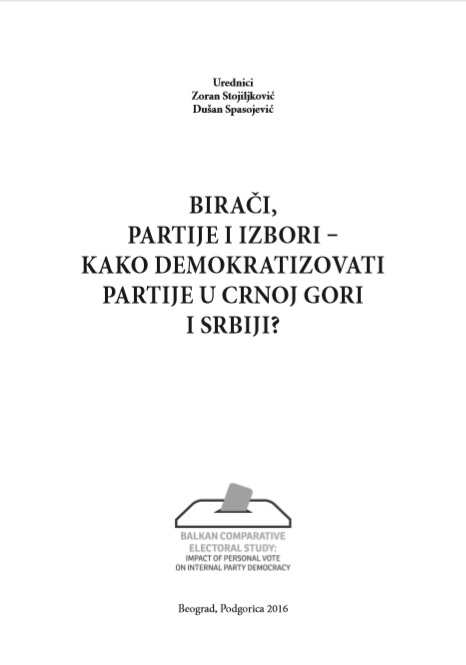The book before you stands as one of the most significant outcomes of the two-year project "Balkan Comparative Election Study - The Impact of Personalized Voting on Intra-Party Democracy." The fundamental research mission of the project, supported by the RPP - the Regional Program for Research Support in the Field of Social Sciences in the Western Balkans, is to illuminate intra-party relations in intricate detail and correlate them with the institutional component - the electoral system and other regulations governing political systems that influence the behavior of political actors. The study at hand presents findings from two institutionally similar countries - Montenegro and Serbia, which, besides sharing a proportional electoral system with closed lists and lacking citizen involvement in candidate selection, also share a political heritage from several common countries, and consequently, a shared cultural-value matrix. Within this project, a study conducted by colleagues from Bosnia and Herzegovina and Kosovo is also available, which compares the outcomes of two systems with preferential voting and aims to investigate whether such a voting system fosters intra-party competition, democratization, and establishes stronger connections between citizens and political elites.
The research question, focused on the institutional design of the political and electoral system, strongly steers our project towards the realm of practical policies. Intra-party relations and the dominance of party leaders prove to be obstacles to further democratization in societies emerging from the former Yugoslavia. The emphasis on the party leader and identification with them diminishes the significance of the connection between voters and elected representatives in parliament, as well as the importance of party electoral and program platforms. All these factors contribute to discretionary decisions in politics, the absence of political accountability, and ultimately, the disengagement of citizens from political participation. Consequently, our project raises one of the most critical questions in all the societies mentioned - is the democratization of political parties a prerequisite for the further democratization of the society in which we live? And in what manner, without harboring utopian ambitions and based on many years of experience in research projects and working groups for electoral system reform, can we at least partially reverse the negative trends we are addressing?
The study before you is divided into three conceptual units - the first, where Milan Jovanović and Vladimir Goati establish a theoretical framework for research, weighing the advantages and disadvantages of party and personal representation, situating this dilemma within the complex equation of intra-party democracy. The second part comprises a detailed presentation of findings from two highly significant empirical studies - a comparative candidate study conducted in 2015, and a public opinion survey conducted at the outset of 2016, with the aim of addressing two fundamental questions - (1) how does the electoral system influence candidates for deputies and their conduct within the party and towards voters, and (2) how does the electoral system affect the electoral and broader political behavior of citizens, i.e., voters. The case of Montenegro is elucidated in detail in the text by Zlatko Vujovic, while the situation in Serbia is analyzed in the texts by Jelena Loncar and Boban Stojanovic, as well as Dusan Spasojevic and Vojislav Mihailovic. This in-depth insight into two rich empirical bases forms the introduction to the third comparative unit, which consists of two texts - the first, where Nikoleta Tomovic and Despot Kovacevic compare the degree of intra-party democracy in Serbia and Montenegro, and the second, the concluding text, penned by Srdjan Darmanovic and Zoran Stojiljkovic, where the findings of the entire studies are deliberated within a broader comparative context.
We hope that this study will, first and foremost, contribute to a better understanding of the issues at hand, as well as their importance and complexity. Given the aforementioned complexity, we recognize that the "solution" to the problem does not lie in altering only one of the electoral-political determinants, but in understanding the complex power dynamics not solely reliant on institutional design. Nonetheless, as a contribution to the ongoing debate on electoral system reform in both countries, we have formulated a set of specific recommendations that complement this study and are grounded in extensive research work. We anticipate that the simultaneous existence of this academic study and the mentioned recommendations will foster a suitable balance between scientific inquiry and application, ultimately influencing the formulation of public policies that underscore the applied dimension of political and social sciences.
